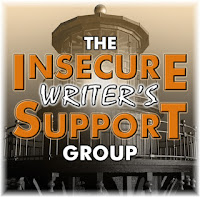Welcome to IWSG Day. The goal of this blog hop is to
share and encourage. Writers can express doubts and concerns without fear of
appearing foolish or weak. Those who have been through the fire can offer
assistance and guidance. It’s a haven for insecure writers of all kinds. IWSG
is the brainchild of Alex
Cavanaugh. To find other contributors, click here. Thank
you to the co-hosts for the March posting of the IWSG: Diedre Knight, Tonya Drecker, Bish Denham, Olga Godim, and JQ Rose.
This month’s optional question: Have you ever read a line in novel or a clever plot twist that caused you to have author envy?
My quick answer? Yes. I’ve devoted quite a few posts here to works that have made me say, “Boy, I wish I wrote that!” but rather than going back and rehashing them, I thought I’d spend this one talking about an author who has awed me for a different reason.
In high school, I took a class called “History through
Literature” during which we read historical fiction set in formulative eras. During class, we discussed the real life events that provided the framework for the novels. Even
now, books from that course stand out in my mind. All Quiet on the Western Front, by Erich Maria Remarque, Night, by Elie Wiesel, Désirée by Annemarie
Selinko, The Great Hunger, by Cecil Woodham-Smith and Tai Pan, by James Clavell.
The taped-up copy of the last one, an “epic” novel written in 1966 about the
founding of Hong Kong , has been sitting on my bookshelf since
high school. (No, I wasn't in high school in 1966!) Last week when the novel I’d wanted to download from my library wasn’t
available, I pulled Tai Pan off the shelf again. At over 700 pages, reading it is
a commitment. Frankly, it’s been so long since I’ve touched it I’ve forgotten
more than I remember, and what impresses me this time is the way Clavell wrote with
such authority about the English and Asian cultures of the mid-nineteenth century.
I can understand why Mr. Burgess, our history teacher, made this required reading. Apparently it took the author two years to research and write what ultimately became Tai Pan. In my mind, I am thinking two years would be a blink to create the complexity and nuance that flows through the story. He was either a genius or for those two years, writing must have been a one hundred percent full-time occupation. Probably both. He wrote with such clarity and depth about the financial and political impact of the English sea trade, (opium for tea and silks,) and about two distinctly different cultures, both of whom believed the other to be barbarians. The storyline involves pirates, romance, intrigue and betrayal, but beyond the entertainment value, reading it reminds me of something. What a person believes based on how they were raised may be diametrically opposed to the beliefs of those from a different culture, but that’s not to say they can’t learn from each other.
Reading the book now, I have to make some exceptions for behaviors in
the novel appropriate to nineteenth century standards and offered
via a 1960’s slant. But even through a 2023 lens, Tai Pan imparts
lessons that matter, even after 50+ years in print.
Way to go, Mr. Burgess!
What book(s) from high school made a lasting impact on you?
